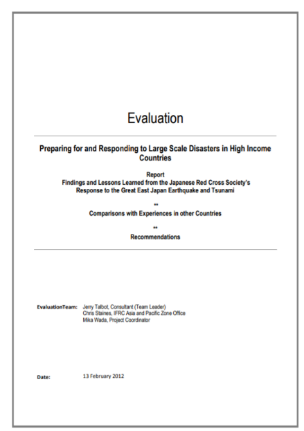Third-Party Evaluation
1. Background and purpose
The JRCS decided to conduct an external evaluation of the recovery assistance projects for the GEJET by a third-party consultant and to sum up the achievements of the projects with the aims of (1) appropriate implementation of the projects and the verification of their effects, (2) utilization for information disclosure and reporting to the public as well as for recommendation, and (3) institutional sharing and preparedness for the future.
In addition to the abovementioned internal evaluations , the JRCS carried out the third-party evaluationin order to ensure the objectivity of the findings of the internal evaluations and verify their neutrality and relevance.
This third-party evaluation was conducted by the Japan Research Institute, Limited. The JRCS received an evaluation report on October 31, 2012, for the projects implemented in FY2011, and another one on October 31, 2013, for the projects in FY2012.
The third-party consultant collected information about the recovery assistance programmes including opinions from the concerned institutions such as municipalities and summarized it in a form which can be used inside and outside of the JRCS.
The positive findings of the evaluation and the identified challenges were extracted as recommendations, so that they were taken into consideration by the JRCS in its planning of next phase of the recovery assistance programmes.
2. Evaluation targets
In the third-party evaluation for the projects in FY2011, the following recovery assistance projects implemented by the JRCS were evaluated.
I. Individual project evaluation
(i) Detailed evaluation
(ii) Brief evaluation
II. Overall evaluation
(i) Evaluation by field of support
(ii) Evaluation by form of support
(iii) Evaluation by region
(iv) Evaluation based on surveys in the affected areas
(v) Evaluation based on recognition of the recovery assistance projects by the public outside the affected areas
(vi) Evaluation of policies/ strategies and organisations/operational structures
3. Evaluation methods
(a) Approach and evaluation criteria for the individual projects evaluation
In the individual project evaluation of each project, output (project outcome) and process (implementation process of a project) were focused on, and a total of 9 items including 2 items of outputs and 7 items of process were evaluated.
| Items evaluated | |
|---|---|
| Output | Quantitative aspects |
| Qualitative aspects | |
| Process | Promptness / Smoothness |
| Efficiency | |
| Effectiveness | |
| Transparency / Relevance | |
| Impartiality | |
(b) Approach to the overall evaluation
An overall evaluation for the recovery assistance projects was implemented based on the following perspectives.
(i) Policies/strategies and operational frameworks of the projects
(ii) Rationality of the selection of the projects implemented
(iii) Allocation of resources (aspects of both finance and human resources)
(iv) Management of the projects implementation
(c) Actions implemented and the methods of examination / analysis
In this evaluation, the following actions were implemented and summarized in the report.
- Review of the JRCS internal evaluation for the recovery assistance projects
- Survey on recognition by the beneficiaries (the affected people) on the recovery assistance projects
- Survey on recognition by the concerned organisations including municipalities on the recovery assistance projects
- Survey on recognition by the general public on the recovery assistance projects
- Survey on the operations of the recovery assistance projects
- Analysis of the details of the above surveys
- Evaluation based on the results of the analysis
Third-Party Evaluation Report

- · Third-Party Evaluation Report for FY 2011, Third Party Evaluation of the Great East Japan Earthquake Recovery Task Force (FY 2011 Project); November 30, 2012
http://www.jrc.or.jp/vcms_lf/Third_Party_Evaluation_2011.pdf - · Third-Party Evaluation Report for FY 2012, Third Party Evaluation of the Great East Japan Earthquake Recovery Task Force (FY 2012 Activities); October 31, 2013
http://www.jrc.or.jp/vcms_lf/Third_Party_Evaluation_2012.pdf














